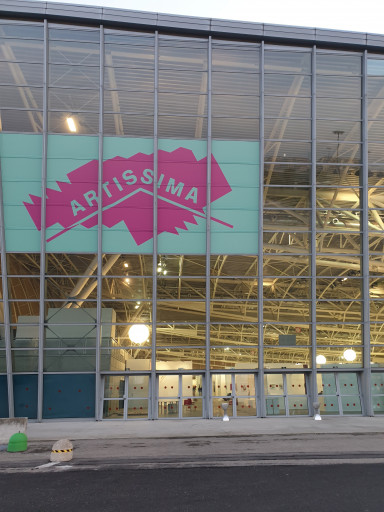

Stefan Kobel
,
Kobel's Art Weekly 45 2022
Ursula Scheer measures the new director of Artissima in Turin, Luigi Fassi, by his own standards in the FAZ: "Strolling through the aisles where 174 galleries from 28 countries - 74 from Italy, 21 from Germany and 42 newcomers - present their offerings, one is not overwhelmed by large decorative painting formats in strong colours, as is the case elsewhere, but often sees, especially among local exhibitors, the barren, grey, installed close to nature and even spiritually inspired. One is in the land of Arte povera. [...] Is all this transformative? That would be asking too much. But Artissima shows awareness that blindly carrying on as before is not an option, that art has to be relevant - and acquiring it is more than making a bank transfer."
Silke Hohmann brings back similar impressions from Turin for Monopol. Eva Karcher compares Artissima in the Tagesspiegel to a supposedly "more sophisticated and global Milan fair Miart". Actually, in Turin, 60 per cent of the exhibitors were from abroad, in Milan the figure was 30 per cent. Jenny Dogliani reports for The Art Newspaper. I visited Artissima for the Handelsblatt and spoke to its director Luigi Fassi for Artmagazine.
A new report on collector behaviour by Clare McAndrew for Art Basel and UBS is available for download (PDF). Angelica Villa summarises what she considers to be the most important findings for Artnews.
The fact that Art Basel, together with the Luma Foundation, has launched a blockchain ecosystem for art called Arcual (PDF) seems to interest only Shanti Escalante-De Mattei of Artnews among relevant colleagues.
The rumours about a possible purchase of Gagosian by Bernard Arnault's LVMH do not stop, but change their direction through the industry newsletter The Canvas: "Indeed, our source assured us, there won't even be an investment. Instead, 'Arnault and Larry have been in discussions about LVMH providing Gagosian a $1 billion line of credit so that the gallery can more competitively compete with the auction houses for major works on the secondary market.'"
Hauser & Wirth is launching its own auction platform with an auction in aid of the United Nations Relief and Works Agency (UNHCR), according to a press release. Eileen Kinsella reports on this for Artnet. Artsy also started with charity auctions.
Tomato or pea soup and mashed potato attacks on artworks have brought museums more media attention in recent weeks than most exhibitions. In any case, the institutions are confronted with existential problems, Frank Kurzhals reminds us in the Handelsblatt: "As a result, museums have become a centre of controversy. What are the counter-arguments of those under attack? Does the end, i.e. wanting to save the climate, justify the means, the attack on the arts? In this discussion, museums retreat, shy away from argumentation, assume as a matter of course that they are relevant. This is particularly noticeable in the case of the houses of fine arts. And yet we hear bad news everywhere. In Nuremberg, there is currently even a discussion about whether the Kunsthalle should be closed in order to save money. The counter-argument of the museums is a mere echo of banal economic arguments."
According to Lee Cheshire in The Art Newspaper, London's cultural institutions are facing severe cuts as the new government redirects funding to the regions.
After three porcelain objects worth a combined $77 million broke at Taipei's National Museum, its director allegedly tried to cover up the accidents, reports Vittoria Benzine at Artnet.
André Heller had a picture frame pasted with set pieces of drawings by Jean-Michel Basquiat and offered them for sale together with a genuine work through a Viennese gallery, the Falter (paywall) in Vienna has researched. Olga Kronsteiner talks with her colleague and lawyer Jakob Pflügl about the possible criminal liability of this act for the Standard. Ursula Scheer summarises the story for the FAZ.
In the dispute between gallery owner Johann König and the ZEIT, a decision by the Hamburg Regional Court is apparently causing cognitive dissonance on both sides, each of which sees itself vindicated. Michael Hanfeld attempts a classification in the FAZ: "The newspaper had reported in a sensational article about alleged sexual assaults by König on several women. König's lawyer, Simon Bergmann, says that the newspaper has now been largely prohibited from doing so, and that this concerns the 'most serious allegations' about which 'Die Zeit' had written. Zeit', in turn, announced on request that the regional court had passed a resolution that 'considers the reporting permissible in decisive parts'. Individual passages of the challenged text had been adapted or removed. The article is still online with the corresponding changes." Meanwhile, Monopol reports that Monica Bonvicini has suspended her cooperation with the gallery until the accusations have been clarified. The publication of König's biography in the USA has been put on hold for the time being, reports Alex Greenbegrer at Artnews.
The story of Dmitri Rybolovlev's private Greek island, told by Alexandra Bregman in The Art Newspaper, seems to have been taken straight out of a James Bond film: "Over the past few months, around 400 local construction workers have been tirelessly developing a resort on the private Greek island of Skorpios. Once inhabited by Jacqueline Kennedy Onassis, the island is now the property of the Russian oligarch and art collector Dmitry Rybolovlev, who has been embroiled in one of the art world's most bitter legal cases for the past seven years. The workers arrive on Skorpios by boat from nearby Lefkada, their phones confiscated so they cannot photograph anything. Around-the-clock surveillance from security cameras and snipers prevent intruders from crossing. A single cruise ship is permitted to dock at a small public beach, but only when the Rybolovlev family is not there." In James Bond, the owners of such islands are always the bad guys.
semi-automatically translated